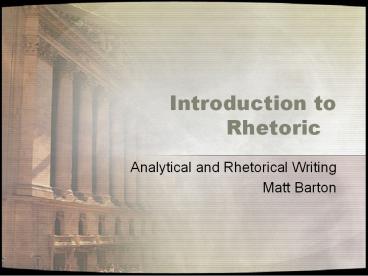Introduction to Rhetoric - PowerPoint PPT Presentation
Title:
Introduction to Rhetoric
Description:
The faculty or ability to discover all available means of ... Peter Ramus took Invention and Arrangement away from Rhetoric and gave them to Philosophy ... – PowerPoint PPT presentation
Number of Views:203
Avg rating:3.0/5.0
Title: Introduction to Rhetoric
1
Introduction to Rhetoric
- Analytical and Rhetorical Writing
- Matt Barton
2
One Minute Prompt 1
- What is effective writing?
3
Well, what is rhetoric?
- Rhetoric is defined as
- The art of persuasion
- Trickery or brainwashing techniques
- Meaningless ornamentation bombast
- The study of effective discourse
4
Ancient Rhetoric
- Aristotle defines rhetoric as
- The faculty or ability to discover all available
means of persuasion in a given situation. - Counterpart of dialectic, a type of formal
reasoning that leads to truth.
5
The History of Rhetoric
- The study of rhetoric began in Ancient Greece.
- A new democracy established
- Citizens had to go before courts to justify their
ownership of land. - The sophists (Protagoras, Gorgias, Isocrates)
were traveling teachers who taught people to
speak persuasively.
6
Protagoras (481-420 BC)
- He is best known for saying, Man is the measure
of all things. - Placed emphasis on using words correctly.
- Charged extremely high fees to attend his
lectures.
7
Gorgias (483-376 BC)
- Gorgias main three arguments were
- Nothing exists
- Even if something exists, nothing can be known
about it, and - Even if something could be known about it,
knowledge about it can't be communicated to
others - Often called The Nihilist.
8
Isocrates (436338 BC)
- Operated a very successful school in Athens
- Combined rhetoric with study of ethics and
politics - Taught practical skills rather than abstract
philosophies
9
Topoi
- Sophists taught a kind of argument template
called a topos (plural topoi), which meant
common places - Example If a quality does not in fact exist
where it is more likely to exist, it clearly does
not exist where it is less likely.
10
Sophistry
- The main sophists main claim is that absolute
truth is irrelevant what matters is what the
intended audience believes to be true.
11
Conflicts with Plato
- Plato complained that the sophists didnt care
about truth they would train people to argue
effectively even if they knew they were wrong. - Compared rhetoric to cookery, or mere
ornamentation.
12
Aristotle
- Argued that rhetoric was a tool that could be
used for good or evil. - His book, the Rhetoric, remains one of the best
treatises ever written on the subject of
rhetoric. - Identified three types of rhetorical proof
- Pathos, Logos, and Ethos
13
Pathos
- Pathos appeals rely on emotions and feelings to
persuade the audience - They are often direct, simple, and very powerful
14
Logos
- Logos appeals rely on the audiences
intelligence to persuade them. - Education causes audiences to be more skeptical
of emotional arguments and more receptive to
logos
15
Ethos
- Ethos is a persons credibility with a given
audience. It can mean sincerity, authority,
expertise, faithful, or any adjective that
describes someone you can trust to do the right
thing.
16
Rhetoric in Ancient Rome
- The Romans took Greek Rhetoric and used them to
teach. - The Romans divided rhetoric into five canons
- Invention
- Arrangement
- Style
- Memory
- Delivery
17
Stasis
- Stasis is the process of discovering the true
issues at the heart of a debate. - Conjectural
- Question of Fact Did Smith kill Jones?
- Definitional
- Question of Definition Was this murder or
manslaughter? - Qualitative
- Question of Quality Did Smith have a good
reason? - Translative
- Jurisdiction Is this the right venue for this
discussion?
18
16th Century (Renaissance)
- Peter Ramus took Invention and Arrangement away
from Rhetoric and gave them to Philosophy - Argued that discovering truth (philosophy) is
not related to presenting the truth (rhetoric)
19
What does formal reasoning leave out?
- Emphasis on certainty and reasoning led to
scientism, or the idea that all non-scientific
claims are of equal value. - With no way to argue about ethics or morality,
non-scientific decisions must be made by force.
20
Modern Rhetoric
- Now we are returning to the classical
perspectives of rhetoric. - Rhetoric is useful for helping us make decisions
about things that we cannot know for certain. - Kenneth Burke defines rhetoric as
- the use of symbols to induce cooperation in those
who by nature respond to symbols.
21
What can I learn from rhetoric?
- Rhetorical thinking means asking yourself these
questions when you are engaged in a written or
spoken argument - What is my claim?
- What statements will I need to make to support my
claim? - How can I show that my evidence really supports
my claim? - Rhetorical thinking is always focused on the
audience.
22
One Minute Prompt
- What is rhetoric?































